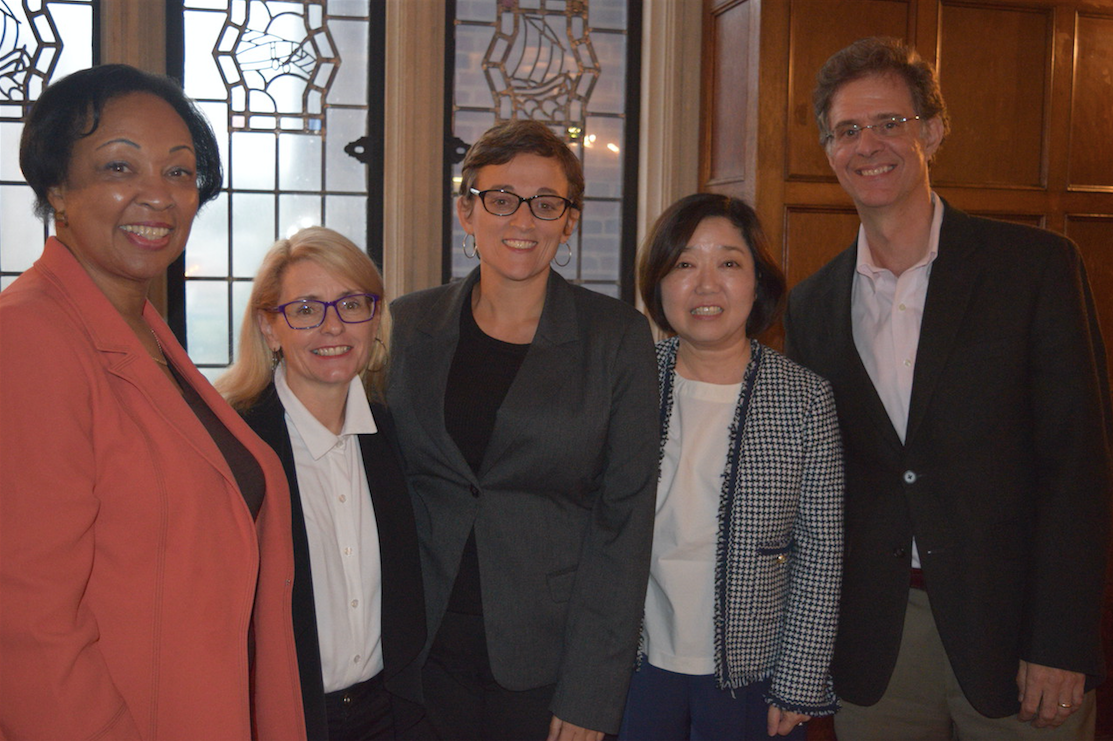Kalmanovitz Initiative Hosts Discussion on Women, Work, and Globalization
Posted in Events Uncategorized Visiting Scholars | Tagged Cocoa Farmers, Denise Brennan, Events, Fida Adely, Global Women, Global Work, Globalization, Gwendolyn Mikell, Joseph A. McCartin, Migration, Sex Work, Unemployment, You-Me Park
The Kalmanovitz Initiative was honored to host a panel discussion among four of Georgetown’s most esteemed faculty members about the experiences of working women whose lives are impacted by globalization. After a brief introduction by KI’s Executive Director Dr. Joseph A. McCartin, each scholar presented on their research and shared stories from their respective field work.
Dr. Gwendolyn Mikell, Professor of Anthropology and Foreign Service, described how a changing global marketplace is transforming the lives of women who work as cocoa farmers in Ghana. She also highlighted the efforts of rural women in Swaziland to develop modern skills and an education, that could in turn be used to support other women.
Many women in these countries are asking the question of what does modernity mean for us? What kinds of work will we take on? – Dr. Mikell
Dr. You-Me Park, Director and Professor of Women’s and Gender Studies at Georgetown, focused the lens on working women who disproportionately provide care to those at the start of life or end of life. She observed that care workers in Korea tend to be migrants with few labor protections and a relentless schedule.
Dr. Park tied poor working conditions in child care and elderly care reflect the way society undervalues the physical body by dismissing our needs when we are most vulnerable.
What I’ve found in my research is that the harder that women work, it seems their work is more devalued or degraded. – Dr. Park
We then heard from Dr. Denise Brennan, Professor and Chair of the Department of Anthropology. Dr. Brennan shared deeply personal photos from her field work and drew out some overarching themes from her research, which focuses on the resilience of sex workers in Central American countries and U.S.-Mexico border communities. The conclusions she shared included: that women are not meaningfully consulted by the organizations that seek to help them; that despite many obstacles women consistently “get it done;” and that women support each other and become each other’s best resource.
If the state is failing these women from cradle to grave, think about what it truly means to have or not have citizenship. – Dr. Brennan
Dr. Fida Adely from the Center for Contemporary Arab Studies in the School of Foreign Service offered the final presentation. Her research focuses on gender and development. Dr. Adely’s remarks zeroed in on her field research in the Middle East, where she studied the internal migration of Jordanian women from rural to urban settings for work. She reflected on the way entering the labor force changes women’s role in the family, as well as the struggles that women face in the workplace due to the gender or other components of their identity.
Some assume that women are forced to migrate by family for income, but the reality for most of these women is that they choose to migrate. – Dr. Adely
The four faculty members then formed a panel where they responded to each other’s insights and answered questions from KI director, Dr. Joseph McCartin, and members of the audience. Although each scholar has conducted field work in separate areas of the world, they were able to interweave their research interests around common themes of struggle and resiliency on the part of working women. The panel discussion also afforded the opportunity to touch on issues that had not been raised in the individual presentations, such as the connection between unemployment and sex work and the exploitation of unpaid labor that women take on as mothers and wives.
This event was the first in a series of discussions that bring together faculty whose research interests align with the Kalmanovitz Initiative’s focus on labor and the working poor.
We would like to express our gratitude to the talented Clara Mejía Orta (COL ’17) for photographing the event and to our visiting researcher Dr. John P. Beck for conceiving the idea for the discussion and helping bring it to fruition.

